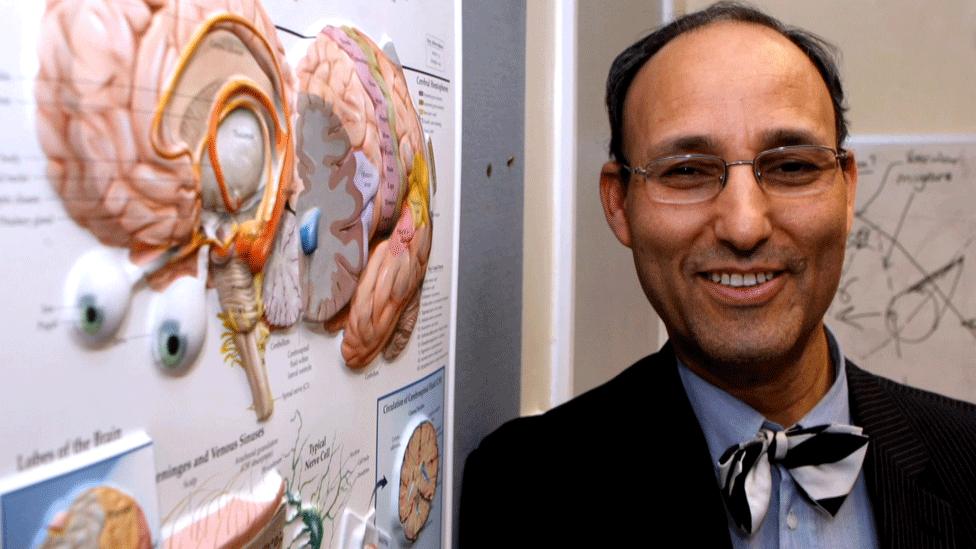My surgeon experimented on me and ruined my life
- Published
Patient Leann Sutherland says surgeon Sam Eljamel "played God" with my body
Leann Sutherland was 21 and suffering from chronic migraines when one of Scotland's top surgeons offered to operate.
She was told she would be in hospital for a few days and had a 60% chance of improvement. Instead she was in for months while Sam Eljamel operated on her seven times.
The BBC can reveal her surgeon - the former head of neurosurgery at NHS Tayside - was harming patients and putting them at risk for years but the health board let him carry on regardless.
NHS Tayside has consistently claimed it only knew about concerns from June 2013 and that they put him under supervision at that point but an NHS whistleblower has told the BBC the health board knew as early as 2009 that there were serious concerns.
BBC Scotland has spoken to three surgeons who worked under Mr Eljamel at Tayside. All three said he was a bully who was allowed to get away with harming patients.
All three said there was a lack of accountability in the department and that Mr Eljamel was allowed to behave as if he were a "god" - partly because of the research funding he brought to the department.
The health board told the BBC it was working with the Scottish government to support an independent review of patients' care under Mr Eljamel and that it could not comment on individual cases.
'I was his guinea pig'
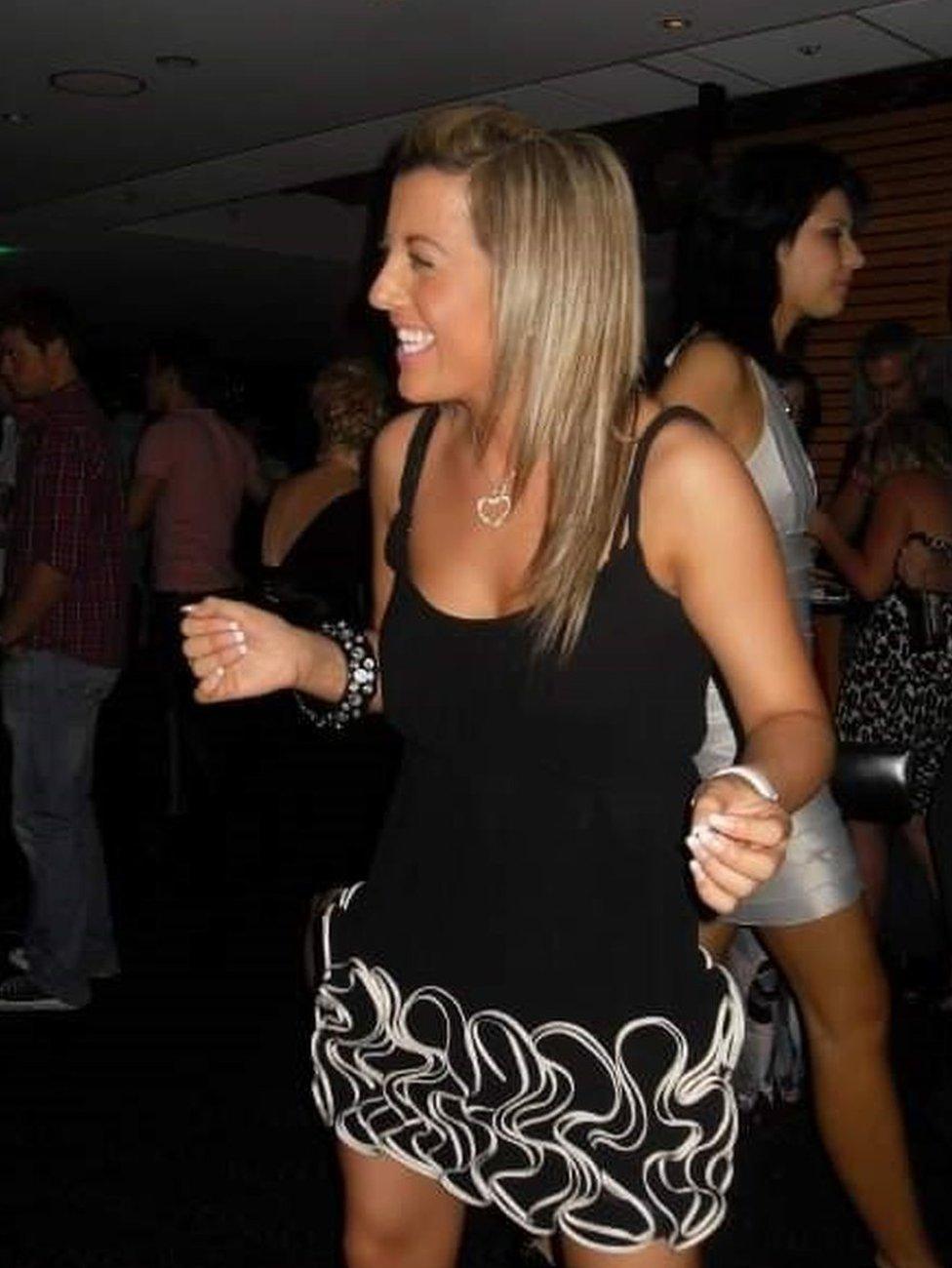
Leann used to work full-time and go on holidays abroad with friends before her operations

Before her operation in 2011 Leann used to work full-time and go on holidays abroad with friends but her life was blighted by migraines.
Mr Eljamel, reputed to be the best neurosurgeon in Scotland, told her he could help.
It would be one operation and she would be home in a matter of days, she was told.
He would remove a small part of her skull to alleviate pressure and he told her he would use a new glue to seal the wound.
Leann told the BBC: "Unfortunately it did not seal properly and it burst.
"The wound burst open and the brain fluid started to pour out the back of my neck."
She says the next day her hospital bed was "soaked" with her spinal fluid.
When she got up to use the bathroom she collapsed and said the fluid went all over the floor. A nurse put a wet floor warning sign on the area.
Leann says that her mum had to chase Mr Eljamel down a corridor to get him to come and look at her - at which point she was rushed back into surgery.
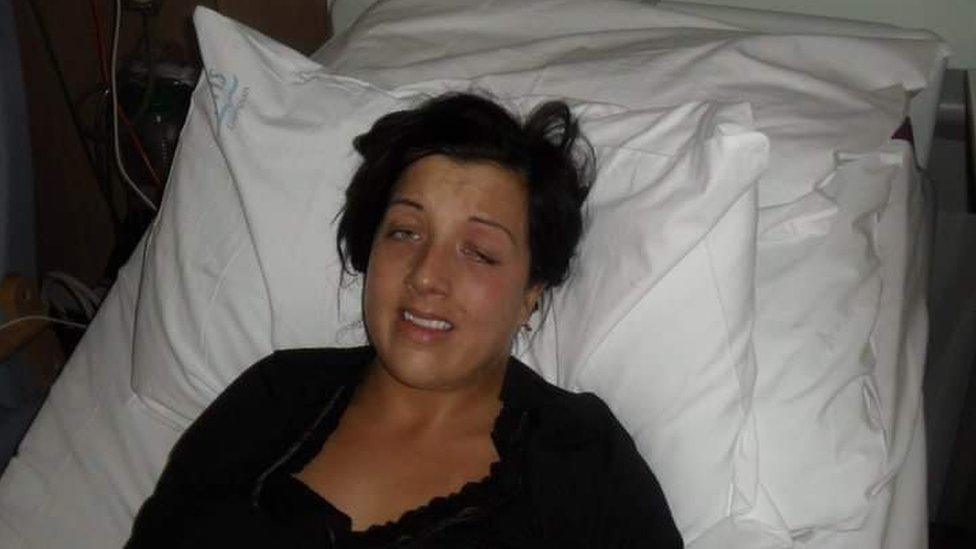
Leann spent months in hospital. She contracted meningitis and developed hydrocephalus. Mr Eljamel ordered her to have four lumbar punctures - which her medical notes say she specifically should not have had.
Leann knows now he was using the glue as part of a research trial.
"Experimenting on me - that's what he was doing," she says.
"There can't be any other reason to try a glue, try different shunts, that's experimenting.
"I was his guinea pig."
She adds: "He had free rein on my body. He was playing God with my body and the NHS handed him the scalpel, seven times."
When Leann tried to raise concerns with staff she was told that Mr Eljamel had saved her life. She was not told that he was under investigation, nor that he had been later forced to step down.
It was only after seeing recent BBC coverage she realised she was not alone.
The impact
Leann is now 33. She lives in constant pain. She needs crutches to walk and has a tube - called a shunt - through her body controlling her spinal fluid.
"Everything is changed," she says. "My dream was to be a police officer and that will never happen.
"I struggle with that, not being able to have the career you want, not being able to have the lifestyle you want, not being able to have children.
"A lot of things have been taken away through no fault of my own."
Leann is one of 100 patients calling for a public inquiry to find out exactly what harm Mr Eljamel did.
The damage to her and other patients is irreversible but she wants to ensure the health board is held accountable and that no other surgeon can cause such damage.
She says she only realised he had harmed patients after seeing a story by BBC Scotland.
"I thought it was just me, I didn't know there was 99 other people," she says.
"I don't understand how he got to wash the blood off his hands and go home."
Whistleblower
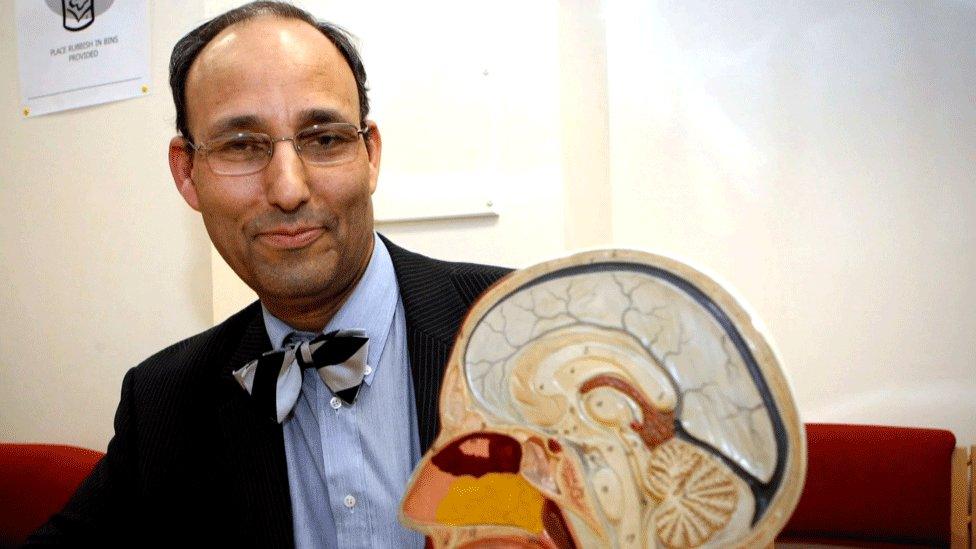
Sam Eljamel was the head of the neurosurgery department in Ninewells Hospital in Dundee
Mr Eljamel was suspended by NHS Tayside following internal and external reviews in 2013 and went to work in Libya.
For the first time, three people who worked with Mr Eljamel have spoken to the BBC.
Mark, not his real name, says he is speaking out now because he fears the health board has still not learnt the lessons of the past.
"I did raise concerns at the time but I was shut down," he says.
"Part of me feels guilty I did not do anything [more] about it but I was too junior.
"We were told we would never get our traineeship."
He says nurses, senior surgeons and managers knew at least as early as 2009 that Mr Eljamel was regularly away from the hospital doing private work when he was meant to be operating on patients.
Mark says that on a weekly basis Mr Eljamel left junior surgeons to operate unsupervised.
"Letting a junior operate when you're not even in the building and a patient coming to harm is negligent," he says.
"NHS Tayside has covered things like this up for a long time in Dundee.
"It went all the way up to the board. They all knew about it."
'Untouchable'
Mark remembers on one occasion being in surgery to watch the junior operating on Mr Eljamel's patient when the junior surgeon accidentally cut through the spinal cord.
He said the spinal fluid was "pouring out" and that he and another surgeon were sent running to find a more senior surgeon. That patient was left permanently disabled.
"What has this top neurosurgeon done to these patients?" He says. "I think serious harm. Cover-ups happen so these things need to be looked into again.
"Drawing a line is easy to say but the culture will not change if you just draw a line in the sand. You need to change the culture first to protect the patients."
The three surgeons told us Mr Eljamel discouraged the use of X-rays because he was so arrogant and because it saved him money.
It is thought that as a result he operated in the wrong place on the spines of at least 70 patients - leaving many permanently disabled.
Mark says one of the reasons Mr Eljamel was considered "untouchable" was that he brought so much money in to the department through research projects which many of them considered to be "odd and even questionable".
A spokeswoman for NHS Tayside said: "The NHS Tayside medical director and chief executive met with the cabinet secretary and local Tayside MSPs in April to discuss the ongoing concerns of patients of Professor Eljamel.
"It was agreed at the meeting that NHS Tayside would work with Scottish government regarding the next steps to support individual patients through a process independent of both the health board and government.
"NHS Tayside remains committed to do whatever is required to support the independent process recognising it will be tailored to the circumstances of individual patients.
"While we cannot comment on individual patients and their treatment due to patient confidentiality, we would invite Ms Sutherland to contact NHS Tayside's Patient Liaison Response Team."
Related topics
- Published20 April 2023

- Published3 November 2022

- Published21 December 2021
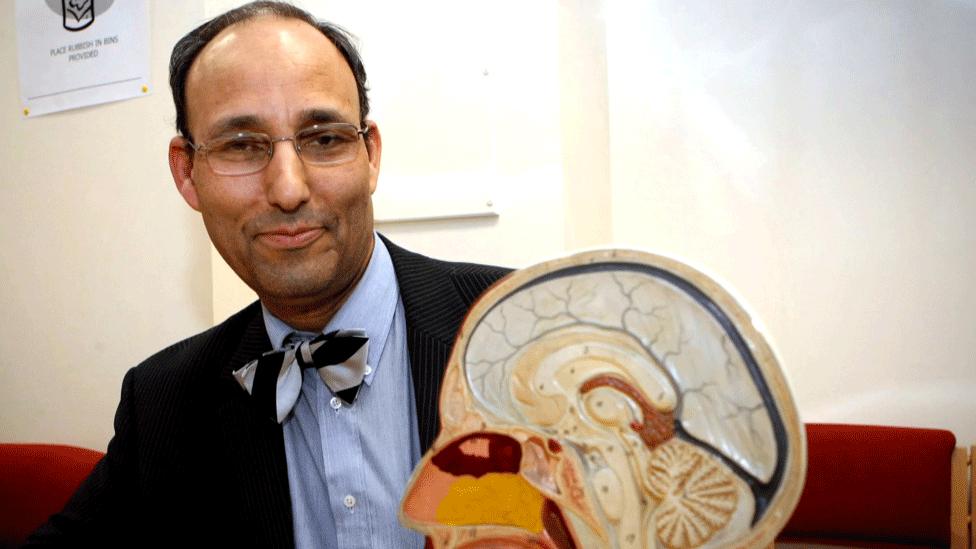
- Published3 September 2018
